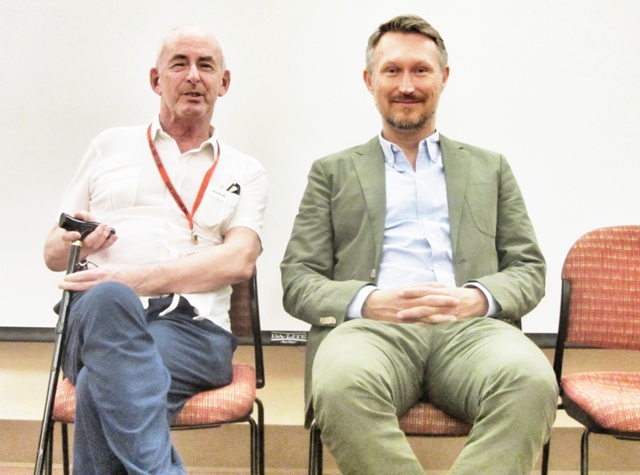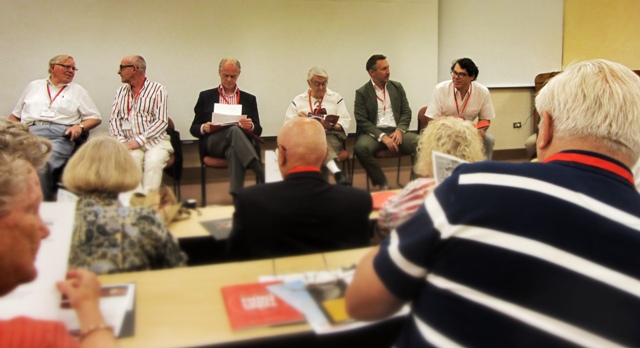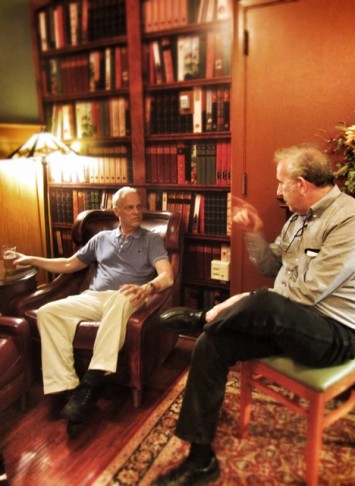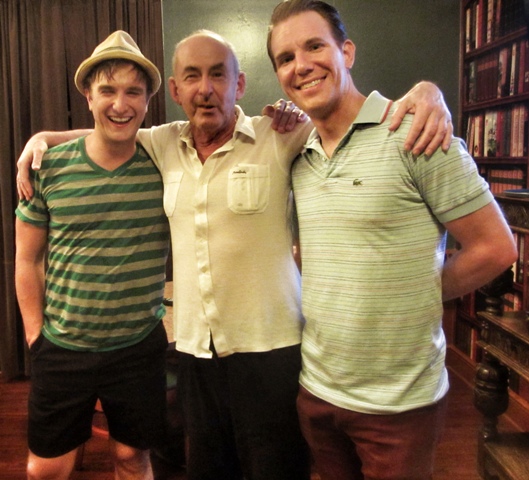Kurt Gänzl
Kurt of Gerolstein Blog
3 August, 2014
For the last five days, I’ve been in Ohio. Yes, Ohio, USA. Yes, I know I said, years ago, that I’d visited America for the last time in my life, but … Why Ohio? Well, I’ve been at a symposium and a festival. A symposium on, and a festival of, musical theatre. Yes, I know I said years ago that I was finished with building my life around and writing books about musical theatre, but …

Flying from Chicago to Cleveland, on American Airlines.
Anyhow. Way back in the southern summer, I received an invitation (“Look ma’am an invitation, Here, ma’am, delivered by hand”) to take part in the Ohio Light Opera’s season and symposium on Operetta, at the College of Wooster. Of course, I couldn’t possibly. I’m a writer, not a speaker. And, anyway, my speech is kind of indistinct since the stroke. No good for public speaking. I couldn’t possibly. And travel all that way from Berlin on my wobbly own?
Ah. Kevin Clarke would be one of the speakers, and he’d be coming from Berlin …? But, I couldn’t possibly. So I said ‘yes’.
And thank goodness I did. I’ve had a most wonderful time.

Kurt Gänzl (l.) and Kevin Clarke, before a round table discussion on “What is Operetta?”
The symposium turned out to be a real classy affair. Apart from Kevin (who is principal of the Operetta Research Center) and I, Stefan Frey, the biographer of three of the most important operettic composers [Franz Lehár, Emmerich Kálmán, Leo Fall], came from Munich, and dearly beloved old friend Richard Norton, the chronicler of Broadway, came from New York. The world’s number one musicals record collector, Brad Bennett, came from Los Angeles, and Andrea Traubner, widow of Richard of Operetta: A Theatrical History renown, from New York. There was Victor Herbert guru Steven Ledbetter from Tanglewood, entertainer Courtenay Kenny from London, mega-operetta fan Chris Weber from Nicaragua … and, most operettically grandiose of all, Yvonne Kálmán, daughter of the famous composer, all the way from Mexico.

The first discussion round on day one, with Courtney Kenny, Kurt Gänzl, Richard C. Norton, Steven Ledbetter, Kevin Clarke and Stefan Frey (from left to right)
We all wended our way to beautiful Wooster, foregathered at the college on the Tuesday morning, and for the next four days, fifteen hours a day, with regular stops for lightning sustenance, it was all operetta and musical theatre from breakfast to bedtime. Even when the sessions of discussion and lecture were over, what did we talk about? Guess. We had Gilbert and Sullivan, we had Kálmán, we had Herbert, Kern and Berlin … my contribution was a G&S talk from the angle of the original caster, and a controversial ‘what is operetta?’. But it wasn’t all talk.

The College of Wooster, Ohio. A view of the campus.
The Ohio Light Opera is a summer company, which plays a wide repertory of musical-theatre shows, staged in a respectful and historical manner, in the 400-seater Freedlander Theatre of the College of Wooster during the vacation. It’s been going and growing since 1979, and this year it presented over fifty performances of seven shows, ranging from Strauss and Sullivan to Kern and Berlin. The Pirates of Penzance and Fledermaus to Call Me Madam.
However, the bit of programming which sparked the interest of all of us present was the promised first English-language production of Imre Kálmán’s A kis király, an Operette hardly seen out since its unfortunate first performances in 1912, and the equally unlikely The Dream City/The Magic Knight, a 1906 piece of burlesque comedy with a score (some of the time) by Victor Herbert.
So after a morning spent talking about music-theatre, to an audience of over a hundred participants, at 2pm and 7.30pm we had … show time!
I managed six shows (jetlag and over-familiarity caused me to skip what, I’m told, was a good My Fair Lady) by the end of which I was starting to be pretty familiar with the members of the company. For, yes, largely the same team played every show. Mabel from Pirates turned up in the chorus of Fledermaus, the splendid Orlofsky from Fledermaus was a dancing girl in Oh! Lady! Lady!, the rebel leader of one show was the low comic of the next, the young trio of baritenor leading men filled all sorts of rôles, large, very large and not large. But lively, and truly sung, danced and acted …

Yvonne Kálmán thanking the cast of “Little King” on stage after the performance.
Thursday was the day of days. After a concert of ‘cutting room floor’ songs by a group of the young folk, and my last bit of ‘work’, it was time for The Little King, translated and directed by the OLO’s artistic director, Steven Daigle. What would it be like? I’m always wary of unsuccessful works by famous writers. Well, now I know. By my judgement, it certainly didn’t and doesn’t deserve to be consigned to oblivion. It is a classically proportioned and flavored musical of the European 1910s, with a solid storyline which is allegedly based on the dethroning of King Manoel of Portugal. It actually seems more to me like a romantic Zarevitch-like take on the tale of His Official Wife and its American musical comedy metamorphosis as The Red Widow, a hit of the previous season on Broadway. But who cares?
It is the standard Operette combination of a romantic and a dramatic tale, with soubrette accompaniment, which Kálmán and his librettists used regularly in his most successful works. I reckon that, here – and especially in the music — the romantic and dramatic side comes off the more strongly and successfully. Once, that is, you have accepted the premise of a prima donna who is a suicide bomber (see The Red Widow). The musical highlights of the piece were the rebels’ ‘Freedom Song’ and the succession of numbers for the King and his prima donna, which bring the second act to its very splendid abdication climax.

A picnic layed out, in front of the theater in Wooster.
Barely had we time to take in all this new and hugely interesting material (plus a delightful picnic on the immaculate green lawns by the theatre) than it was time for Chapter Two. And it was rather a contrast. Victor Herbert is known for ‘Ah Sweet Mystery of Life’ and ‘Kiss Me, Again’ rather than for burlesque music, but that is what we had here. Dream City is a burlesque sketch, written for the low ‘Dutch’ comic, Joe Weber, and the inserted The Magic Knight is a broad parody of Wagner’s Lohengrin. It’s a sort of musical theatre which doesn’t exist today. Well, more’s the pity.

Downtown Wooster, Ohio.
It’s topical – all about property developers and their victims – full of the stock comic characters of the turn-of-the-century German-American stage, one joey-joey after another, one ‘pop’ song after another – with titles such as ‘Nancy, I Fancy You’ and ‘I don’t think I’ll ever be a Lady’ – it has vaudeville acts and parodies pasted into its programme, and the central burlesque of grand opera is simply a hoot.

OLO’s artistic director Steve Daigle, who directed “Dream City,” among other titles.
Staged, directed and played with enormous vigor and no end of fun, it went down a treat with the packed house (and with me!) … how did this kind of musical theatre ever fade away? This should be standard repertoire, above all in its native America.
Six shows in four days. If they weren’t all from different parts of the musical theatre canon, you’d get them muddled up in your memories. Sitting on the plane, on the long trip back to Berlin, I pulled out my personal favorite performances and moments of the week. In sort of chronological order.
“Pirates.” The most sprightly, lively Mabel Stanley (Chelsea Friedlander) I’ve ever seen. No pale and wandering prima donna, but a jolly, naughty opéra-bouffe leading lady with a searing soprano that soared over the ensemble.
I’d just lectured on G&S casting, and pointed out Sullivan’s preference for Jewish leading ladies (Alice May, Helene Crosmond, Marion Hood, Leonora Braham): Miss Friedlander joins the club. Sullivan would have loved her. In fact, he’d probably have loved the whole female chorus with their flowing ringlets and ditsy frocks.
Fledermaus. In another splendidly comical and lively performance, my favorite moments came in perhaps unexpected places: the delightfully limber Frank of Jayson Lebaron and, above all, the exceptional Orlofsky of Olivia Maugham. A delicious mezzo voice, a sense of fun and – the reason the Prince is played by a girl, is because he’s a teenager – Ms Maugham made him a real character: not a middle-aged contralto in drag.

Yvonne Kálmán and Stefan Frey signing the new biography on Emmerich Kálmán in the foyer of the theater.
Little King. Not a show to find your favorites amongst the supporting roles. Here, all the spotlight is on, and all the starlight comes from, the two leading characters. Clark Sturdevant, in the title role, was believably royal and believably dramatic, and sang with grand tenorious energy, and Natalie Ballenger as the lady with the bomb was … explosive! But I did have a special weakness for Anthony Maida in the Ernst Tautenhayn comedy and dance role.
Call Me Madam is a pure and simple star vehicle, and Alexa Devlin took every advantage of its opportunities, but my golden moments came from the juveniles. Stephen Faulk and Tara Sperry were quite enchanting in acting, singing and dancing … perfect casting, alongside the powerhouse Mrs Sally Adams.

OLO’s star Alexa Devlin who took on the Ethel Merman part in “Call Me Madame.”
Oh! Lady!! Lady!!! is a piece of period froth which needs a special light and bubbling touch in its playing. Nathan Brian in the central role of Bill Finch had that touch down to a ‘T’ and his Mollie (Wendy Marck) was an ideal partner who gave the wisely-restored ‘Bill’ in such a way as to make it seem a new song, and not a chestnut.
And Dream City?
Everyone. Just everyone. The company had the (Joe) Weberian style right at their fingertips. Daniel Neer, hilarious in the low ‘Dutch’ Joe Weber role, Nathan Brian as his sleazy song-and-dance protagonist, Alexa Devlin as the raucous comedy maid, Julie Wright Costa in one of several triumphant character roles as the battleaxe wife … and I’m still laughing at Sturdevant’s pure, parfait and poncy Knight.

Kurt Gänzl with a glass of red wine, at the picknick between lectures and talks and performances.
But, if I were giving out my ‘Kurt’ awards in Ohio, I would have to award the golden statue to Natalie Ballanger. Anyone who can play and sing as she did, as the prima donna bomber in The Little King, so as to give me a genuine quivery lip, and then come out a few hours later, as the Belle of Malaria Centre, and do Cissie Loftus impersonations of Hattie Williams and Lillian Russell in such a way as to have the house (especially me!) in fits of laughter, is a rather special artist. Not to say the ideal leading lady for a repertory company. A leading lady who played in the chorus in Oh! Lady!! Lady!!!. That’s what this company is all about. And I love them for it.
PS Kevin and I both picked our favorite chorus member. Tricky when you have a chorus that includes last night’s leading lady! But, guess what? We both picked the same person. Hannah Kurth, take a bow!

Richard C. Norton (l.) discussing the symposiun, after it was over, with Michael Miller of the Operetta Foundation who was one of the organizers.
The company is, of course, not only players. The team includes a vast back and front-stage staff and a fine orchestra which almost bulges from its pit. I liked very much their accompaniment to Sullivan and to Strauss, I loved their burleycue Victor Herbert, and only felt that the Kálmán could have had a bit more oomph, especially in its dance numbers, and the Kern a little more bubble.
And now, I’ve just rolled in to Berlin on the milk-train flight. Wooster, Ohio, with its lovely green lawns and its treat of musical theatre seems a world away. Well, I suppose it is. But I sha’n’t forget it. The music-theatre conversation and camaraderie, the shows and the singers, the new friends … all in five days!
To read the original version of the article, click here.

Kurt Gänzl with two of OLO’s brightest male stars, Stephen Faulk (l.) and Nathan Brian.
